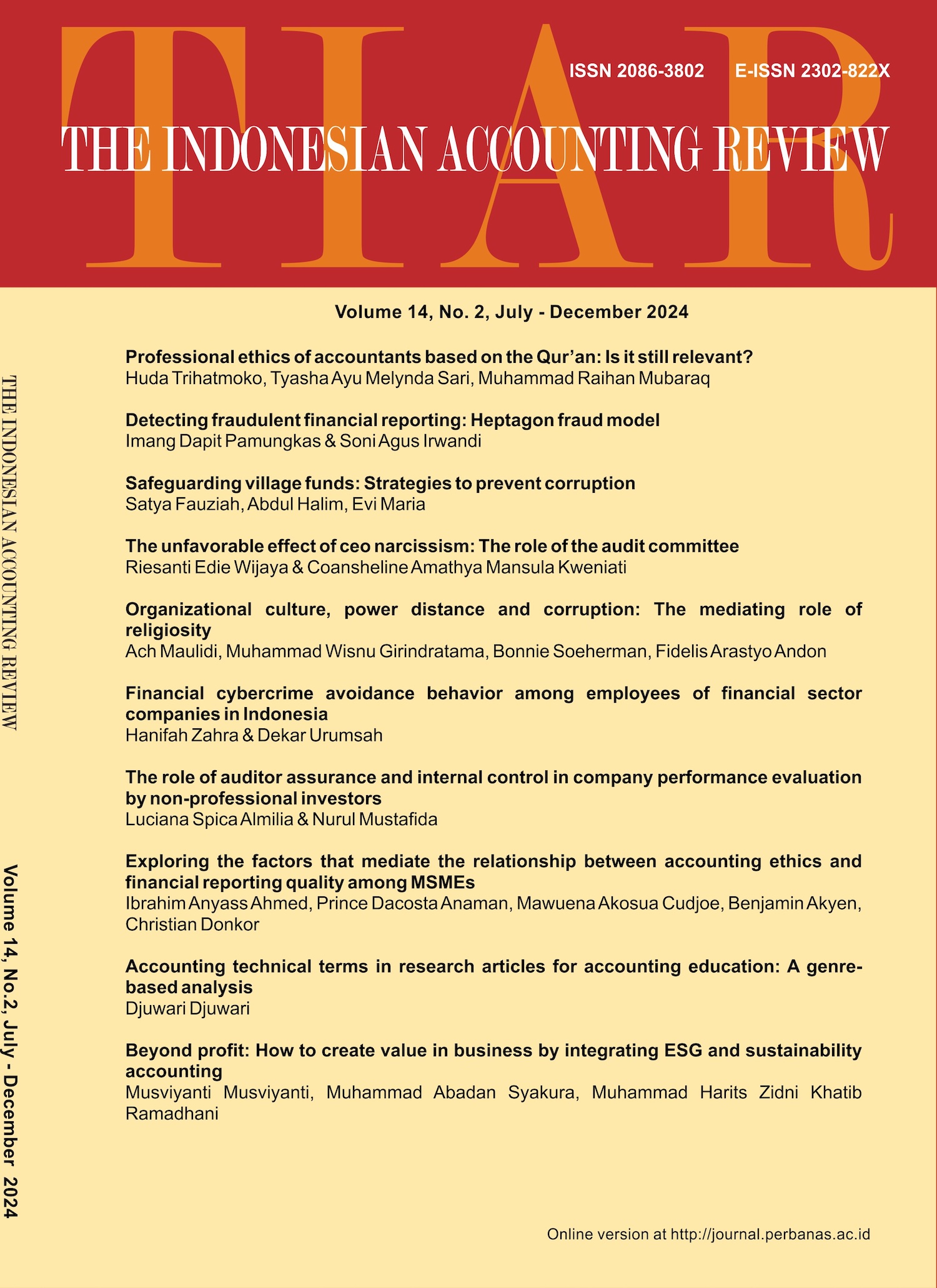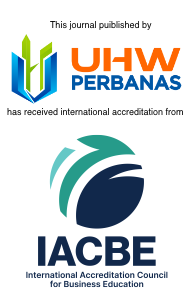Organizational culture, power distance and corruption: The mediating role of religiosity
DOI:
https://doi.org/10.14414/tiar.v14i2.4795Keywords:
Organizational culture, Power distance, Corruption, ReligiosityAbstract
We examine how organizational culture and power distance influence religiosity and, in turn, how these variables affect corruption. We gathered data from Indonesian public servants and analyzed the relationships using PLS-SEM. The findings suggest a significant inverse relationship between religiosity and corruption, reinforcing ethical paradigms that position religious adherence as a key deterrent to corrupt behavior. Notably, religiosity acts as a critical mediator, negatively channeling the effects of organizational culture on corruption. However, this mediating effect does not extend to the power distance-corruption nexus, suggesting that the hierarchical structure may not inherently bear upon moral conduct. Interestingly, while organizational culture positively shapes religiosity, power distance does not exhibit a similar influence, highlighting the complex roles these organizational variables play in shaping ethical behavior. Theoretically, the findings challenge assumptions about the direct ethical impact of hierarchical structures, adding depth to existing frameworks onpower distance and moral conduct. For policymakers and organizational leaders, the findings underline the importance of fostering a culture that promotes religiosity as a deterrent to corruption.
References
Aboobaker, N., Edward, M., & KA, Z. (2020). Workplace spirituality and employee loyalty: an empirical investigation among millennials in India. Journal of Asia Business Studies, 14(2), 211-225.
Adamovic, M. (2022). How does employee cultural background influence the effects of telework on job stress? The roles of power distance, individualism, and beliefs about telework. International Journal of Information Management, 62, 102437.
Alshehri, F., Fotaki, M., & Kauser, S. (2021). The effects of spirituality and religiosity on the ethical judgment in organizations. Journal of Business Ethics, 174(3), 567-593.
Amoah, C., & Steyn, D. (2023). Barriers to unethical and corrupt practices avoidance in the construction industry. International Journal of Building Pathology and Adaptation, 41(6), 85-101.
Asatiani, A., Hämäläinen, J., Penttinen, E., & Rossi, M. (2021). Constructing continuity across the organisational culture boundary in a highly virtual work environment. Information systems journal, 31(1), 62-93.
ACFE. (2024). Occupational Fraud 2024: A Report to the Nations. Association of Certified Fraud Examiners
Astrachan, J. H., Binz Astrachan, C., Campopiano, G., & Baù, M. (2020). Values, spirituality and religion: Family business and the roots of sustainable ethical behavior. Journal of Business Ethics, 163(4), 637-645.
Aven, B., & Iorio, A. (2023). Organizing for misconduct: A social network lens on collective corporate corruption. Research in Organizational Behavior, 100191.
Bagga, S. K., Gera, S., & Haque, S. N. (2023). The mediating role of organizational culture: Transformational leadership and change management in virtual teams. Asia Pacific Management Review, 28(2), 120-131.
Bardhan, P. (2017). Corruption and development: a review of issues. Political corruption, 321-338.
Bahoo, S., Alon, I., & Paltrinieri, A. (2020). Corruption in international business: A review and research agenda. International Business Review, 29(4), 101660.
Bosio, E., Hayman, G., & Dubosse, N. (2023). The Investment Case for E-Government Procurement: A Cost–Benefit Analysis. Journal of Benefit-Cost Analysis, 14(S1), 81-107.
Burhan, Q. U. A., Khan, M. A., & Malik, M. F. (2023). Achieving transparency in business processes by developing and implementing ethical climate: an integrated model of ethical leadership and engagement. Business Process Management Journal, 29(3), 757-776.
Canning, E. A., Murphy, M. C., Emerson, K. T., Chatman, J. A., Dweck, C. S., & Kray, L. J. (2020). Cultures of genius at work: Organizational mindsets predict cultural norms, trust, and commitment. Personality and Social Psychology Bulletin, 46(4), 626-642.
Cantarero, K., Szarota, P., Stamkou, E., Navas, M., & Dominguez Espinosa, A. D. C. (2021). The effects of culture and moral foundations on moral judgments: The ethics of authority mediates the relationship between power distance and attitude towards lying to one’s supervisor. Current Psychology, 40, 675-683.
Castro, A., Phillips, N., & Ansari, S. (2020). Corporate corruption: A review and an agenda for future research. Academy of Management Annals, 14(2), 935-968.
Chan, C., Ananthram, S., Thaker, K., & Liu, Y. (2022). Do religiosity and ethical principles influence ethical decision-making in a multi-faith context? Evidence from India. Journal of Business Research, 149, 772-785.
Chan, C., & Ananthram, S. (2019). Religion-based decision making in Indian multinationals: A multi-faith study of ethical virtues and mindsets. Journal of Business Ethics, 156, 651-677.
De Clercq, D., Fatima, T., & Jahanzeb, S. (2021). Ingratiating with despotic leaders to gain status: The role of power distance orientation and self-enhancement motive. Journal of business ethics, 171(1), 157-174.
De Vita, G., & Vozza, D. (2024). The Ethics of Deferred Prosecution Agreements for MNEs Culpable of Foreign Corruption: Relativistic Pragmatism or Devil’s Pact?. Business Ethics Quarterly, 1-29.
Empson, L. (2020). Ambiguous authority and hidden hierarchy: Collective leadership in an elite professional service firm. Leadership, 16(1), 62-86.
Ekwueme, E. (2021). Dampening corruption and money laundering: emissions from soft laws. Journal of Money Laundering Control, 24(4), 848-859.
Fathallah, R., Sidani, Y., & Khalil, S. (2020). How religion shapes family business ethical behaviors: An institutional logics perspective. Journal of Business Ethics, 163(4), 647-659.
Frenkel, M., & Wasserman, V. (2023). Bodies in-between: Religious women’s-only spaces and the construction of liminal identities. Gender, Work & Organization, 30(4), 1161-1177.
Friis, I. (2020). Preservation of incentives inside the firm: A case study of a Quasi-market for cost-based transfer pricing. Journal of Management Accounting Research, 32(2), 137-157.
Galen, L. W. (2012). Does religious belief promote prosociality? A critical examination. Psychological bulletin, 138(5), 876.
Gallego-Alvarez, I., Rodríguez-Domínguez, L., & Martín Vallejo, J. (2020). An analysis of business ethics in the cultural contexts of different religions. Business Ethics: A European Review, 29(3), 570-586.
Gauthier, B., Goyette, J., & Kouamé, W. A. (2021). Why do firms pay bribes? Evidence on the demand and supply sides of corruption in developing countries. Journal of Economic Behavior & Organization, 190, 463-479.
Gorsira, M., Steg, L., Denkers, A., & Huisman, W. (2018). Corruption in organizations: Ethical climate and individual motives. Administrative Sciences, 8(1), 1-19.
Groebner, D. F., Shannon, P. W., & Fry, P. C. (2018). Business statistics: A decision-making approach. Pearson.
Gustafsson, K. M., & Lidskog, R. (2018). Boundary organizations and environmental governance: Performance, institutional design, and conceptual development. Climate Risk Management, 19, 1-11.
Hair, J. F., Risher, J. J., Sarstedt, M., & Ringle, C. M. (2019). When to use and how to report the results of PLS-SEM. European business review, 31(1), 2-24.
Haron, H., Jamil, N. N., & Ramli, N. M. (2020). Western and Islamic values and ethics: Are they different?. Journal of Governance and Integrity, 4(1), 12-28.
Heath, A. F., Richards, L., & De Graaf, N. D. (2016). Explaining corruption in the developed world: the potential of sociological approaches. Annual Review of Sociology, 42(1), 51-79.
Hegtvedt, K. A., Johnson, C., Gibson, R., Hawks, K., & Hayward, J. L. (2022). Power and procedure: Gaining legitimacy in the workplace. Social Forces, 101(1), 176-201.
Herzog, P. S., King, D. P., Khader, R. A., Strohmeier, A., & Williams, A. L. (2020). Studying religiosity and spirituality: A review of macro, micro, and meso-level approaches. Religions, 11(9), 437.
Hofstede, G., Neuijen, B., Ohayv, D. D., & Sanders, G. (1990). Measuring organizational cultures: A qualitative and quantitative study across twenty cases. Administrative Science Quarterly, 286-316.
Jancsics, D. (2024). Organization and organizationality of corrup-tion. Sociology Compass, 18(7), 1-17.
Kangas, M., Kaptein, M., Huhtala, M., Lämsä, A. M., Pihlajasaari, P., & Feldt, T. (2018). Why do managers leave their organization? Investigating the role of ethical organizational culture in managerial turnover. Journal of Business Ethics, 153, 707-723.
Kashif, M., Zarkada, A., & Thurasamy, R. (2017). The moderating effect of religiosity on ethical behavioural intentions: An application of the extended theory of planned behaviour to Pakistani bank employees. Personnel Review, 46(2), 429-448.
Kent, R. (2020). Data construction and data analysis for survey research. Bloomsbury Publishing.
Kiaos, T. (2023). An interpretative framework for analysing managerial ideology, normative control, organizational culture and the self. Cogent Business & Management, 10(1), 2163795.
Kuenzi, M., Mayer, D. M., & Greenbaum, R. L. (2020). Creating an ethical organi-zational environment: The relationship between ethical leadership, ethical organizational climate, and unethical behavior. Personnel Psychology, 73(1), 43-71.
Lin, B., & Xie, J. (2023). Superior administration’s environmental inspections and local polluters’ rent seeking: A perspective of multilevel principal–agent relationships. Economic Analysis and Policy, 80, 805-819.
Liu, Y., Chen, S., Bell, C., & Tan, J. (2020). How do power and status differ in predicting unethical decisions? A cross-national comparison of China and Canada. Journal of Business Ethics, 167, 745-760.
Luo, S., Wang, J., & Tong, D. Y. K. (2020). Does power distance necessarily hinder individual innovation? A moderated-mediation model. Sustainability, 12(6), 1-16.
Morris, M. W., Hong, Y. Y., Chiu, C. Y., & Liu, Z. (2015). Normology: Integrating insights about social norms to understand cultural dynamics. Organizational behavior and human decision processes, 129, 1-13.
Mugellini, G., Della Bella, S., Colagrossi, M., Isenring, G. L., & Killias, M. (2021). Public sector reforms and their impact on the level of corruption: A systematic review. Campbell Systematic Reviews, 17(2), e1173.
Neeley, T., & Reiche, B. S. (2022). How global leaders gain power through downward deference and reduction of social distance. Academy of Management Journal, 65(1), 11-34.
Newman, A., Le, H., North-Samardzic, A., & Cohen, M. (2020). Moral disengagement at work: A review and research agenda. Journal of Business Ethics, 167, 535-570.
Olujobi, O. J. (2023). Nigeria’s upstream petroleum industry anti-corruption legal framework: the necessity for overhauling and enrichment. Journal of money laundering control, 26(7), 1-27.
Onyango, G. (2021). Whistleblowing behaviours and anti-corruption approaches in public administration in Kenya. Economic and Political Studies, 9(2), 230-254.
Onyango, G. (2020). Inter-institutional trust and multi-agency networks in anti-corruption efforts in public Administration in Kenya. African Studies Quarterly, 19(2), 17-36.
Pielsticker, D. I., & Hiebl, M. R. (2020). Survey response rates in family business research. European Management Review, 17(1), 327-346.
Roszkowska, P., & Melé, D. (2021). Organizational factors in the individual ethical behaviour. The notion of the “organizational moral structure”. Humanistic Management Journal, 6(2), 187-209.
Sampath, V. S., & Rahman, N. (2019). Bribery in MNEs: The dynamics of corruption culture distance and organizational distance to core values. Journal of Business Ethics, 159, 817-835.
Sartor, M. A., & Beamish, P. W. (2020). Private sector corruption, public sector corruption and the organi-zational structure of foreign subsidiaries. Journal of Business Ethics, 167, 725-744.
Scalzo, G., Akrivou, K., & Fernández González, M. J. (2023). A personalist approach to business ethics: New perspectives for virtue ethics and servant leadership. Business Ethics, the Environment & Responsibility, 32, 145-158.
Schein, C. (2020). The importance of context in moral judgments. Perspectives on Psychological Science, 15(2), 207-215.
Scholl, W., & Schermuly, C. C. (2020). The impact of culture on corruption, gross domestic product, and human development. Journal of Business Ethics, 162(1), 171-189.
Shahzad, K., Hong, Y., Muller, A., DeSisto, M., & Rizvi, F. (2024). An investigation of the relationship between ethics-oriented HRM systems, moral attentiveness, and deviant workplace behavior. Journal of Business Ethics, 192(3), 591-608.
Shmueli, G., Sarstedt, M., Hair, J. F., Cheah, J. H., Ting, H., Vaithilingam, S., & Ringle, C. M. (2019). Predictive model assessment in PLS-SEM: guidelines for using PLSpredict. European journal of marketing, 53(11), 2322-2347.
Silal, P., Jha, A., & Saha, D. (2023). Examining the role of E-government in controlling corruption: A longitudinal study. Information & Management, 60(1), 103735.
Stanford, M., & Whitehouse, H. (2021). Why do great and little traditions coexist in the world’s doctrinal religions?. Religion, Brain & Behavior, 11(3), 312-334.
Stolz, J. (2009). Explaining religiosity: towards a unified theoretical model 1. The British journal of sociology, 60(2), 345-376.
Tacconi, L., & Williams, D. A. (2020). Corruption and anti-corruption in environmental and resource management. Annual Review of Environment and Resources, 45(1), 305-329.
Taggart, G., & Zenor, J. (2022). Evaluation as a moral practice: The case of virtue ethics. Evaluation and Program Planning, 94, 102140.
Torsello, D., & Venard, B. (2016). The anthropology of corruption. Journal of management inquiry, 25(1), 34-54.
Tu, W., Yang, J., & Zheng, Y. (2020). Influence of individual values on attitudes toward corruption: What undermine formal anticorruption effectiveness. Asian Journal of Social Psychology, 23(3), 264-277.
Wickberg, S. (2021). Understanding corruption in the twenty-first century: Towards a new constructivist research agenda. French Politics, 19(1), 82-102.
Yuan, F., & Zhou, J. (2015). Effects of cultural power distance on group creativity and individual group member creativity. Journal of Organizational Behavior, 36(7), 990-1007.
Downloads
Submitted
Published
How to Cite
Issue
Section
License
Copyright (c) 2025 The Indonesian Accounting Review

This work is licensed under a Creative Commons Attribution-NonCommercial 4.0 International License.

















